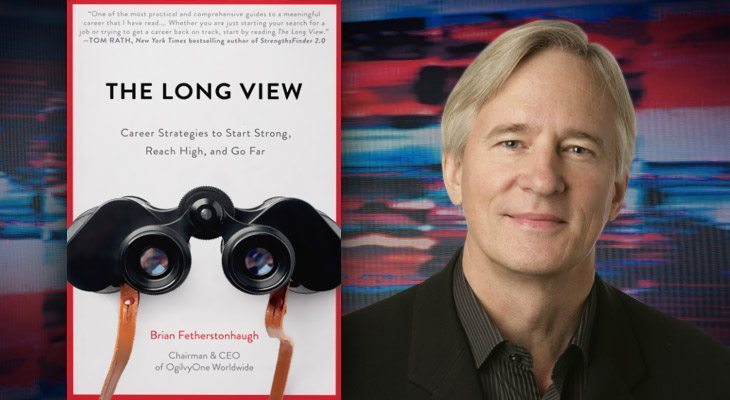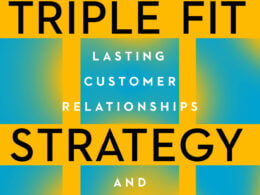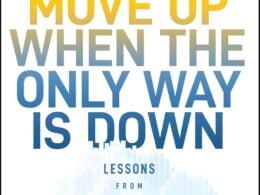The following excerpt was selected exclusively for StartupNation readers from “The Long View: Career Strategies to Start Strong, Reach High and Go Far…” by Brian Fetherstonhaugh, CEO of OgilvyOne Worldwide. Excerpted with permission by Diversion Publishing, originally published on Sept. 6, 2016.
Here is what I’ve found: most people have the wrong approach to careers. The majority across all age groups think of their work life as a job, not a career. Too much focus is placed on the immediate next step, not the pathway. Most treat a career like a sprint, when, in fact, it is a 45-plus-year marathon. They are more focused on getting promoted on Tuesday than on having great choices when it really matters—when they are in their forties and fifties. Many are deeply worried about their careers, and are seeking advice, but finding few answers. The notion of a career is changing fast, and it is hard to rely on what has worked in the past. As a result, too many people hop around aimlessly, or get stuck in unrewarding work, seemingly unable to break out of a rut. They need a plan. You need a plan.
5 things you need to know to build a career plan
- Careers last a surprisingly long time, and embrace three distinctly different stages. Careers last much longer than people think—45 years or more—and are likely to get even longer in the future. For most people, there are more years of career after the age of forty than before. Careers consist of three major stages, each lasting about fifteen years. The three stages are highly interconnected, and what you do in one stage creates opportunities and consequences in later stages.
- Stage one is the time to start strong. Your career efforts must be focused on discovery and equipping yourself for the long journey ahead. Your learning curve is more important than your job title. Create the foundation for your career and establish good early habits. In chapter 8, we dive deeper into Stage One and learn hands-on lessons on how to get in the game and get off to a powerful start.
- Stage two is the time to reach high. The prime objective for this stage is to find your sweet spot—the intersection of what you’re good at, what you love to do, and what the world appreciates. It is the time to differentiate yourself from the pack, to stand out, and to become eligible for career pathways that will be most rewarding to you. Focus on your strengths and largely ignore your weaknesses. For more tactics and stories on Stage two, see chapter 9.
- Stage three is devoted to achieving lasting impact and finding a sustainable new career pathway that will likely need to last well into your sixties or even seventies. You have three critical jobs in Stage three: pass the torch to the next generation, stay relevant and ignite a new career flame for yourself.
Related: Rock Bottom to Rock Star [Book Excerpt]
- “Fuel” is important—it matters what you build on. In order to propel yourself through the long journey, you will need abundant supplies of career fuel. This fuel comes in three main forms: transportable skills, meaningful experiences and enduring relationships. Without this fuel, you risk becoming fragile and vulnerable as the global workplace continues to shift in unpredictable ways. Fuel is critical throughout your career. In Stage one you need to accumulate it, in Stage two you need to take advantage of it, and in Stage three you need to refresh and preserve it. Learn more about the various forms of fuel in chapter 3.
- Careers are built through the skillful investment of time. It takes patience and persistence to build sustainable fuel levels. Becoming a highly employable expert or “master” is not just the result of innate talent, but of the application of thousands of hours of learning, experience and practice. How you invest your time in work and in life has a profound impact on your success and happiness.
- Careers do not progress in linear or predictable ways. You must remain in constant discovery and learning mode. Career opportunities will evolve, and your own life goals will change. When you are confronted with new pathways and opportunities, remain calm and think strategically. Be prepared to embrace the inevitable changes and adjust your career strategy accordingly. Successful careers are a combination of diligent planning and good luck. The diligent planning is essential, because it makes you eligible for the luck.
- A career is so much more than a job: it’s a big part of life. That is why you need a career-planning framework that doesn’t just compare jobs, but takes a holistic approach to how your career fits in with your broader life ambitions—parenthood, global travel, your future and ultimately your happiness. You owe yourself a career strategy and a plan. And there is no question about who needs to take accountability for that plan. There are over seven billion people on the planet, and only one of them will be with you throughout your entire career. It’s you.
Related: Sign up to receive the StartupNation newsletter!
“The Long View: Career Strategies to Start Strong, Reach High and Go Far…” by Brian Fetherstonhaugh is available now.






